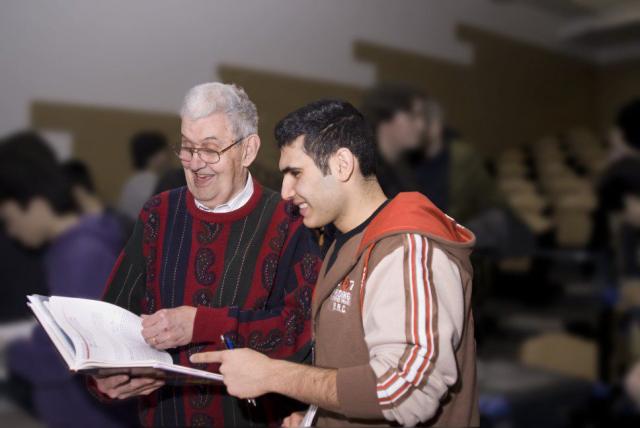Last Wednesday, Erich Vogt, one of the founders and former director of TRIUMF gave an exceptional talk at the Fairmont Lounge in St.John's College at UBC. Titled "The Evolution of Stars and the Creation of Elements" Vogt explored the great developments of astrophysics in the 20th century and explained the innovative field TRIUMF is entering with a new 100 Million dollar radioactive beam. According to Vogt, "It is fifty years since we gained a basic outline of the processes in which a star evolves from a cloud of hydrogen, formed in the Big Bang, through various fusion reactions, until its death throes in a final explosion - leaving either a white dwarf, a neutron star or a black hole. We see that our Universe can appear to be very calm and full of wonder, but it is also subject to very violent events." Now, with TRIUMF's latest facility, the direct study of the processes taking place in the cores of stars—both sensible ones like the sun, and also some of the more reckless and unstable characters—will allow to be further analyzed and understood.
Vogt's exemplary role in the development of nuclear physics at the University of British Columbia and at TRIUMF has had a long standing legacy. Perhaps this explains why the Institute of Vancouver constantly request his participation and his talks continue to fill up rooms and institutes like the Pacific Institute of Theoretical Physics. According to Vogt, "the key is to develop a resonance with your audience, show not only that you're knowledgeable but that you're deeply excited about the topic. Stellar evolution has been an interest of mine for the last 60 years and engaging the public is always important." He expresses these words as he smiles and claims our world is amazing because it has led nature to be user-friendly in allowing us to answer so many questions. When asked about the difficulty of explaining certain concepts to the general public, Vogt reveals that it can be done with people of all ages and backgrounds. In his mind, it all comes down to avoiding technical jargon and using broader ideas "because all of us live a life in which we see stars and motion in the sky. We make our own observations without realizing it. When I gave the talk last night, I realized many people, men and women, were interested in what it's all about...how does the world work?" And that is all he could have asked for.
TRIUMF is privileged to have Vogt's presence within the lab. His passion for teaching and sharing his knowledge seems boundless. Whether it's in an office, a classroom or an auditorium, Vogt continues to inspire his fellow colleagues, students and the general public to quest for more answers in the realm of physics and explain the unexplainable.
By: Maria Jose Crousillat
Communication's Assistant
2009-Feb-27

